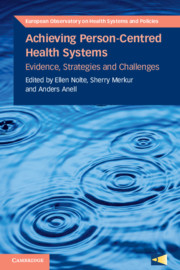Already in 2006, Council Conclusions by EU health ministers confirmed access to good quality health care as an overarching value for health systems across Europe. Next to effectiveness and safety, patient experience is considered a key component of health care quality. Historically, concern with patient safety has been the prime driver of EU-level rules on medical products. In the last decade, effectiveness has risen to the fore of health system analysis through EU-level processes such as the European Semester. In recent years, we have seen initiatives focusing on the patient perspective, assessing how health systems can draw on patient-reported experiences and outcomes. This book delivers a key contribution to this debate.
The book’s very title, referring to ‘person-centredness’, raises some compelling questions on how to frame the current conceptual framework. Does a term like ‘patient-centredness’ cover dimensions which are more general in service delivery and not necessarily limited to experiences related to morbidity? How would this concept fit with areas such as prevention and health promotion, where the whole idea is to help people avoid becoming patients? These questions go well beyond ‘petty semantics’ and the discussions raised in this book are very timely.
The book presents valuable lessons from areas in health systems where persons (many of them patients) have already found ways of expressing choice, gaining a voice and more generally participating in health systems. In doing so, it convincingly makes the point that a more systematic move to person-centred care will support health systems in addressing the challenges they face. Obviously, there are barriers for health systems to overcome when pursuing a person-centred redesign, duly recognized in the book.
Current population health literacy levels across the EU will need to be raised if citizens are to take up a more active role in co-steering health systems. Also, health systems need to overcome the important information gap they face. The uptake of more holistic, person-centred health data holds great potential. The quality of care and the performance of health systems across the EU stand to gain significantly from improvements in this direction. The development of such complementary health indicators will help policy-makers and health professionals to more effectively treat patients, who are increasingly frail and suffering from multiple morbidities. The European Commission is actively supporting Member States to achieve this health system transformation.
For many years patient groups have rightfully demanded from policy-makers ‘nothing about us without us’. Now it is time to push this principle to a higher level. Inspired by this book, we should strive for a person-centred redesign of health systems that will include all patient groups, as well as the wider population that health systems aim to keep healthy.

